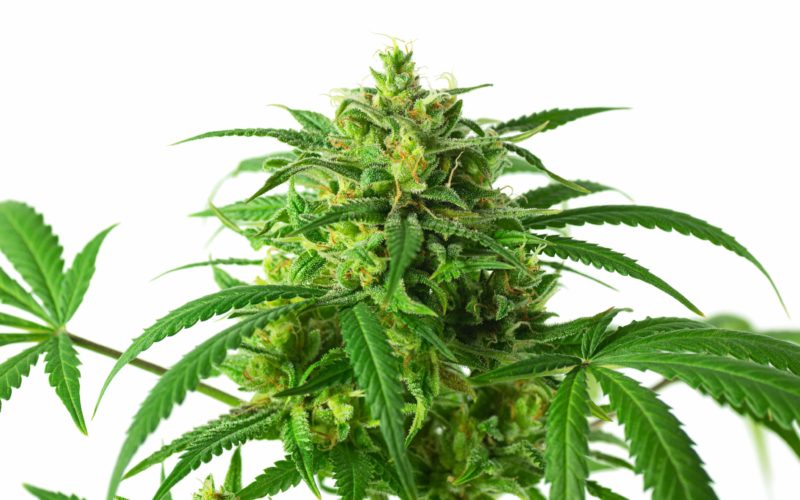Government
Legal Cannabis Sales Dip Sharply in Colorado

The decline in medical cannabis sales is a concern, experts say.
Sales of both medical and recreational cannabis in Colorado plummeted in June compared to the previous year, the state’s Department of Revenue reported, an alarming decline that industry officials attribute to a variety of reasons.
Medical marijuana sales totaled $19,235,656 in June—down from $34,534,293 in June 2021. Recreational pot sales, meanwhile, generated $127,157,358 in June—down from $152,719,813 in June 2021.
The decline in medical cannabis sales has been especially concerning to certain members of the industry.
Truman Bradley, executive director of the Colorado-based trade association the Marijuana Industry Group, said that the medical cannabis sales are “the lowest they’ve been since the legalization of recreational [cannabis]” in 2012, and that he’s “very concerned.”
Bradley told local news station The Denver Channel that the drop in sales is down to a number of factors.
“On the medical side, some very strict purchase limits came in, you know, for pharmaceuticals. Patients can get up to a one-month supply. But for medical cannabis, their daily purchase limits for folks who are immunocompromised or disabled, this is a real problem,” Bradley told the station.
The station reports that experts are “worried about people with health conditions having access to the treatment they need,” saying that “patients are paying more in taxes for similar products at recreational facilities.”
Others believe that the decline in medical cannabis sales is simply a result of patients bypassing the tedious application process to obtain a prescription in favor of the more accessible recreational marijuana products.
“We think it might be just people don’t want to go through the hassle of getting their medical marijuana card. They’d rather just walk down the street and go to a recreational dispensary,” said Eric Escudero, a spokesman for the city of Denver’s Department of Excise & Licenses and Office of Marijuana Policy, as quoted by the Denver Channel.
“I think what some people are really wondering is if there’s an oversaturation of the marijuana market in Denver. We have a lot of stores, whether it be medical or recreational,” Escudero added.
But Denver, Colorado’s largest city and the state capital, also “says it’s seen a decline in people applying for a medical marijuana license over the last five years,” according to the Denver Channel.
It has been a similar story in another western state, Arizona, where medical cannabis sales have also been dropping.
Citing figures from the Arizona Department of Revenue, the AZ Mirror reported last month that “sales of medical cannabis dipped to slightly less than $45 million in May, their lowest total since January 2021, when adults were first allowed to purchase marijuana for recreational use.”
The difference in Arizona, however, has been the ongoing strength of the new recreational cannabis industry.
According to the AZ Mirror, “initial estimates from tax collectors peg recreational sales at $76.5 million [for the month of May], the fifth time adult-use sales surpassed the $70 million mark.”
“Medical cannabis sales dropped precipitously for the seventh month in a row to slightly less than $45 million in May, only the second time in the past year medical sales dropped below the $50 million mark,” the AZ Mirror reported. “Preliminary numbers for June indicate $33.7 million in medical sales with recreational sales already on pace to hit another record, with $66.4 million reported so far.”
Last year was the first year that recreational cannabis sales were legal in the Grand Canyon State, and medical cannabis sales were greater throughout 2021 than recreational.
Source: https://hightimes.com/news/legal-cannabis-sales-dip-sharply-in-colorado/
Business
New Mexico cannabis operator fined, loses license for alleged BioTrack fraud

New Mexico regulators fined a cannabis operator nearly $300,000 and revoked its license after the company allegedly created fake reports in the state’s traceability software.
The New Mexico Cannabis Control Division (CCD) accused marijuana manufacturer and retailer Golden Roots of 11 violations, according to Albuquerque Business First.
Golden Roots operates the The Cannabis Revolution Dispensary.
The majority of the violations are related to the Albuquerque company’s improper use of BioTrack, which has been New Mexico’s track-and-trace vendor since 2015.
The CCD alleges Golden Roots reported marijuana production only two months after it had received its vertically integrated license, according to Albuquerque Business First.
Because cannabis takes longer than two months to be cultivated, the CCD was suspicious of the report.
After inspecting the company’s premises, the CCD alleged Golden Roots reported cultivation, transportation and sales in BioTrack but wasn’t able to provide officers who inspected the site evidence that the operator was cultivating cannabis.
In April, the CCD revoked Golden Roots’ license and issued a $10,000 fine, according to the news outlet.
The company requested a hearing, which the regulator scheduled for Sept. 1.
At the hearing, the CCD testified that the company’s dried-cannabis weights in BioTrack were suspicious because they didn’t seem to accurately reflect how much weight marijuana loses as it dries.
Company employees also poorly accounted for why they were making adjustments in the system of up to 24 pounds of cannabis, making comments such as “bad” or “mistake” in the software, Albuquerque Business First reported.
Golden Roots was fined $298,972.05 – the amount regulators allege the company made selling products that weren’t properly accounted for in BioTrack.
The CCD has been cracking down on cannabis operators accused of selling products procured from out-of-state or not grown legally:
- Regulators alleged in August that Albuquerque dispensary Sawmill Sweet Leaf sold out-of-state products and didn’t have a license for extraction.
- Paradise Exotics Distro lost its license in July after regulators alleged the company sold products made in California.
Golden Roots was the first alleged rulebreaker in New Mexico to be asked to pay a large fine.
Source: https://mjbizdaily.com/new-mexico-cannabis-operator-fined-loses-license-for-alleged-biotrack-fraud/
Business
Marijuana companies suing US attorney general in federal prohibition challenge

Four marijuana companies, including a multistate operator, have filed a lawsuit against U.S. Attorney General Merrick Garland in which they allege the federal MJ prohibition under the Controlled Substances Act is no longer constitutional.
According to the complaint, filed Thursday in U.S. District Court in Massachusetts, retailer Canna Provisions, Treevit delivery service CEO Gyasi Sellers, cultivator Wiseacre Farm and MSO Verano Holdings Corp. are all harmed by “the federal government’s unconstitutional ban on cultivating, manufacturing, distributing, or possessing intrastate marijuana.”
Verano is headquartered in Chicago but has operations in Massachusetts; the other three operators are based in Massachusetts.
The lawsuit seeks a ruling that the “Controlled Substances Act is unconstitutional as applied to the intrastate cultivation, manufacture, possession, and distribution of marijuana pursuant to state law.”
The companies want the case to go before the U.S. Supreme Court.
They hired prominent law firm Boies Schiller Flexner to represent them.
The New York-based firm’s principal is David Boies, whose former clients include Microsoft, former presidential candidate Al Gore and Elizabeth Holmes’ disgraced startup Theranos.
Similar challenges to the federal Controlled Substances Act (CSA) have failed.
One such challenge led to a landmark Supreme Court decision in 2005.
In Gonzalez vs. Raich, the highest court in the United States ruled in a 6-3 decision that the commerce clause of the U.S. Constitution gave Congress the power to outlaw marijuana federally, even though state laws allow the cultivation and sale of cannabis.
In the 18 years since that ruling, 23 states and the District of Columbia have legalized adult-use marijuana and the federal government has allowed a multibillion-dollar cannabis industry to thrive.
Since both Congress and the U.S. Department of Justice, currently headed by Garland, have declined to intervene in state-licensed marijuana markets, the key facts that led to the Supreme Court’s 2005 ruling “no longer apply,” Boies said in a statement Thursday.
“The Supreme Court has since made clear that the federal government lacks the authority to regulate purely intrastate commerce,” Boies said.
“Moreover, the facts on which those precedents are based are no longer true.”
Verano President Darren Weiss said in a statement the company is “prepared to bring this case all the way to the Supreme Court in order to align federal law with how Congress has acted for years.”
While the Biden administration’s push to reschedule marijuana would help solve marijuana operators’ federal tax woes, neither rescheduling nor modest Congressional reforms such as the SAFER Banking Act “solve the fundamental issue,” Weiss added.
“The application of the CSA to lawful state-run cannabis business is an unconstitutional overreach on state sovereignty that has led to decades of harm, failed businesses, lost jobs, and unsafe working conditions.”
Business
Alabama to make another attempt Dec. 1 to award medical cannabis licenses

Alabama regulators are targeting Dec. 1 to award the first batch of medical cannabis business licenses after the agency’s first two attempts were scrapped because of scoring errors and litigation.
The first licenses will be awarded to individual cultivators, delivery providers, processors, dispensaries and state testing labs, according to the Alabama Medical Cannabis Commission (AMCC).
Then, on Dec. 12, the AMCC will award licenses for vertically integrated operations, a designation set primarily for multistate operators.
Licenses are expected to be handed out 28 days after they have been awarded, so MMJ production could begin in early January, according to the Alabama Daily News.
That means MMJ products could be available for patients around early March, an AMCC spokesperson told the media outlet.
Regulators initially awarded 21 business licenses in June, only to void them after applicants alleged inconsistencies with how the applications were scored.
Then, in August, the state awarded 24 different licenses – 19 went to June recipients – only to reverse themselves again and scratch those licenses after spurned applicants filed lawsuits.
A state judge dismissed a lawsuit filed by Chicago-based MSO Verano Holdings Corp., but another lawsuit is pending.
Source: https://mjbizdaily.com/alabama-plans-to-award-medical-cannabis-licenses-dec-1/
-

 Business2 years ago
Business2 years agoPot Odor Does Not Justify Probable Cause for Vehicle Searches, Minnesota Court Affirms
-

 Business2 years ago
Business2 years agoNew Mexico cannabis operator fined, loses license for alleged BioTrack fraud
-

 Business2 years ago
Business2 years agoAlabama to make another attempt Dec. 1 to award medical cannabis licenses
-

 Business2 years ago
Business2 years agoWashington State Pays Out $9.4 Million in Refunds Relating to Drug Convictions
-

 Business2 years ago
Business2 years agoMarijuana companies suing US attorney general in federal prohibition challenge
-

 Business2 years ago
Business2 years agoLegal Marijuana Handed A Nothing Burger From NY State
-

 Business2 years ago
Business2 years agoCan Cannabis Help Seasonal Depression
-

 Blogs2 years ago
Blogs2 years agoCannabis Art Is Flourishing On Etsy













